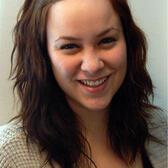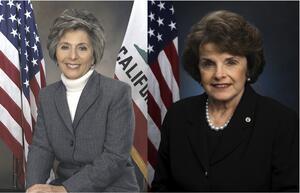Jewesses in politics represent!
This week marks a big one when it comes to major anniversaries of Jewish women in politics. Let’s take a look at the role of political Jewesses past and present, shall we? We’ve got a lot to be proud of!
-
In 1970, loud-mouthed Jewish Manhattanite Bella Abzug ran for Congress on the slogan “This woman’s place is in the House… the House of Representatives!” A self-professed feminist, environmentalist and pacifist, Abzug was elected on a platform that was shockingly liberal, even for the ‘70s. She was the second Jewish woman ever elected to the U.S. Congress and quickly became known as a voice for social justice, especially civil rights, reproductive choice and economic issues. When asked when she became a feminist, Abzug answered, “The day I was born.” Though she lost a Senate bid by a margin of one percent, she went on to become chair of the first National Women's Conference, advocating for equal opportunities for women, reproductive rights, and protection against domestic abuse.
-
This week marks the 21th anniversary of the day Dianne Feinstein and Barbara Boxer were elected to the U.S. Senate, making history in more ways than one. They were the first female senators from California, the first female, Jewish senators, and the first female pair to represent any state at the same time. Feinstein, a former San Francisco mayor, and Boxer, a former Congresswoman, both still serve in the Senate, where their political views regularly coincide on issues like women’s rights, health care and environmental protection. In 2010, when Boxer’s Senate seat was at risk, the two women campaigned together, with Feinstein praising her Senate counterpart’s “spine of steel.” Feinstein has not yet announced whether she will run for reelection in 2012, but hinted at it while on the campaign trail with Boxer.
-
Linda Lingle became Hawaii’s first female governor on November 5, 2002; she is one of only two Jewish women to have served as governor of a U.S. state. Lingle, a St. Louis native who relocated to Hawaii after college, served on the Maui County Council for ten years before becoming Maui County Mayor in 1990 – the first woman to do so. As governor, Lingle’s proprieties have been promoting Hawaii’s tourism industry, balancing the state’s budget and improving the quality of education, though she angered much of the progressive Jewish community last summer when she vetoed a civil union bill and made seemingly disparaging remarks about homosexuality. Lingle recently announced that she will run for U.S. Senate as Sen. Daniel Akaka retires.
While we’re on the topic: A number of Jewish women currently serve in the U.S. Congress, though only one, Rep. Shelley Berkley of Nevada, will be up for reelection in 2012. Rather than seek reelection to the House, Berkley, who in 1998 became Nevada’s first Jewish congresswoman, has announced that she will seek the Democratic bid for the Senate seat vacated by Sen. John Ensign’s retirement. Other Jewesses in Congress whose seats are safe (for now) include:
-
Rep. Nita Lowey (D-NY18) – Elected in 1988; first female chairperson of the Democratic Congressional Campaign Committee
-
Rep. Janice Schakowsky (D-IL9) – Elected in 1998; serves as Chief Deputy Whip to Rep. John Lewis
-
Rep. Susan Davis (D-CA53) – Elected in 2000
-
Rep. Allyson Schwartz (D-PA13) – Elected in 2004
-
Rep. Debbie Wasserman Schultz (D-FL20) – Elected in 2004; current chairwoman of the Democratic National Committee
-
Rep. Gabrielle Giffords (D-AZ8) – Elected in 2006 as Arizona’s first Jewish congresswoman Rep.
So tell us: Who’s your favorite political Jewess, past or present?







